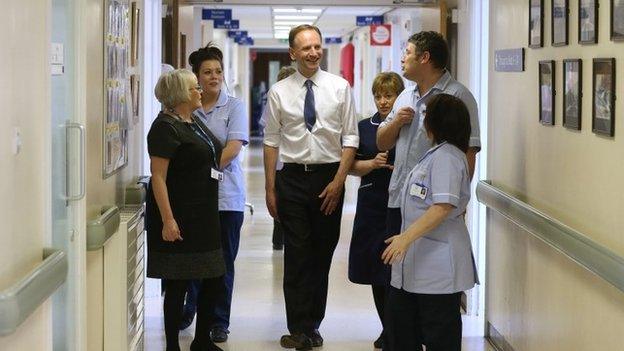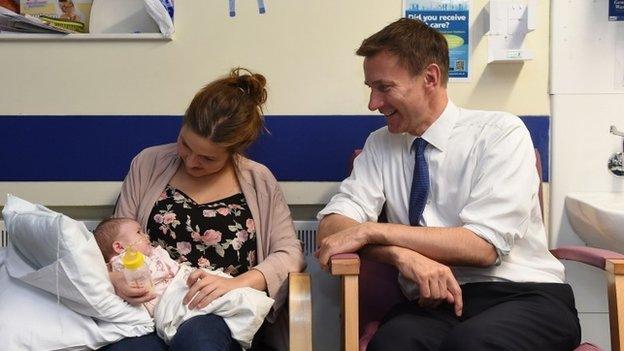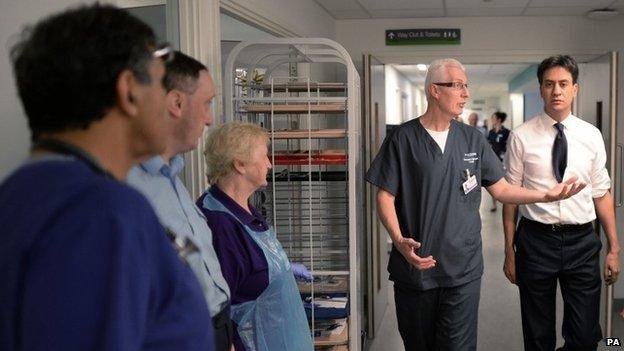NHS: Where will the money come from?
- Published

Simon Stevens, chief executive of NHS England, faces a challenge
The new boss of NHS England is calling for an extra £8bn to be spent on the health service each year in the same week as figures confirmed that the amount the country is borrowing is rising again.
At first sight it sounds like an awful lot of money. In reality it is not that much although it may still be very hard to find.
The call is for the NHS budget to be £8bn higher not next year or the year after but by the end of the next parliament i.e. by 2020.
This is an above inflation or real terms increase of 1.5%. That's historically very low.
For example, even in the years of the "Thatcher cuts" the average annual rise in health spending was 3% (health inflation is said to be higher than inflation in the economy as a whole due to improving technology).
Hospital closures
The coalition have delivered a small rise in NHS spending over the past four years - amounting to almost 1% a year.

Health Secretary Jeremy Hunt on a visit to a Birmingham Children's Hospital
But - and here's the real point in my view - the NHS in England will only need an increase as low as £8bn if the NHS can deliver efficiency savings on a scale never before seen.
The last NHS chief executive called for £20bn savings over the five years from 2010.
They have been made but a third of the savings have come from real terms cuts in the pay of health service workers. Today's report calls for £22bn in savings but says that pay cuts cannot be repeated if the health service is to hang on to the staff it needs.
That word "efficiencies" may involve unpopular hospital mergers and closures, controversial changes to working practices and increased use of the private sector (more on this below).
We can be persuaded, cajoled or forced to eat less, drink less and smoke less. Report after report has said this is a priority but saying it and doing it are very different things particularly when the measures favoured by many in the medical profession - such as minimum alcohol pricing, banning smoking in parks, plain paper wrapping of cigarette packets or vouchers to reward fat people for losing weight - are condemned by many as "nanny state" interventions.
This is where the politics comes in.
Cancer diagnosis
Labour want the NHS to be at the centre of the next election. At their party conference, Ed Miliband promised to raise taxes - on expensive homes, on tobacco firms and on hedge funds and other City "bad boys" - to raise £2,5bn a year extra.

Ed Miliband meets staff at Salford Royal Hospital
Since then it's emerged that it would take a considerable amount of time to introduce those new taxes and the amount they will raise is a calculated guess. What's more, some of that money would pay for new promises - such as quicker cancer diagnosis - rather than filling the existing funding gap. So, the full sum promised may not be available until midway through the next Parliament.
Labour point out that at their conference the Tories promised £7bn of unfunded tax cuts - money that can't be spent on the NHS - whereas Labour has a track record of spending more on health.
What the party could also say - but chooses not to - is that it is planning to borrow more for longer than the Tories (the IFS estimate unto £28bn a year more) as it thinks the deficit should be addressed by cuts that are less fast and less deep.
Privatisation
The Tories reply is simple - "it's the economy, stupid" - and if you don't get that right you won't be able to pay for the NHS at all.
The Lib Dems say they'd spend an extra £1bn a year above inflation paid for by - amongst other things - making higher earners pay more tax on their shares
That will form the core of the argument at the next election.
But what about privatisation?
Simon Stevens was asked again and again this morning to put a cap on how much work the private sector should do. He refused to do so whilst stressing that the decisions in most cases would be taken by GPs and pointing out that 94% of all work is now done by NHS suppliers.
Stevens believes, though chose not to say so, that the private sector can help cut costs where it encourage innovation. One example is the private company that employs doctors using smartphones in their own homes to examine skin conditions - lumps and moles - thus cutting the cost of unnecessary hospital appointments.
Labour, who backed the increased use of private firms when Stevens was first Alan Milburn and then Tony Blair's political adviser, now say it has gone too far and risks undermining the values of the NHS. They say that the profits of private companies take cash away from the NHS front line and worry that changes in competition rules will allow firms to sue the NHS if they're denied a contract and rig the market to drive up costs.
So, how far private sector involvement should be allowed to go will also form part of the election battle.
However, underneath the noise and heat of the political battle there is a more consensus than you might think.
Today's report says the NHS can be afforded even at a time of record pressure on public spending. No party disagrees or perhaps dares to.
All agree on the need for big changes in the way health care is organised - the integration of health and social care, for example.
Everyone knows that much more needs to be done to combat obesity, alcohol abuse and to eradicate smoking.
The test will be in words though and not deeds.
PS Although today's report is about the NHS in England the challenges facing the health services in Scotland, Wales and Northern Ireland are very similar
PPS Forgive the length of this post. I'm writing it whilst waiting for an appointment in an NHS hospital.